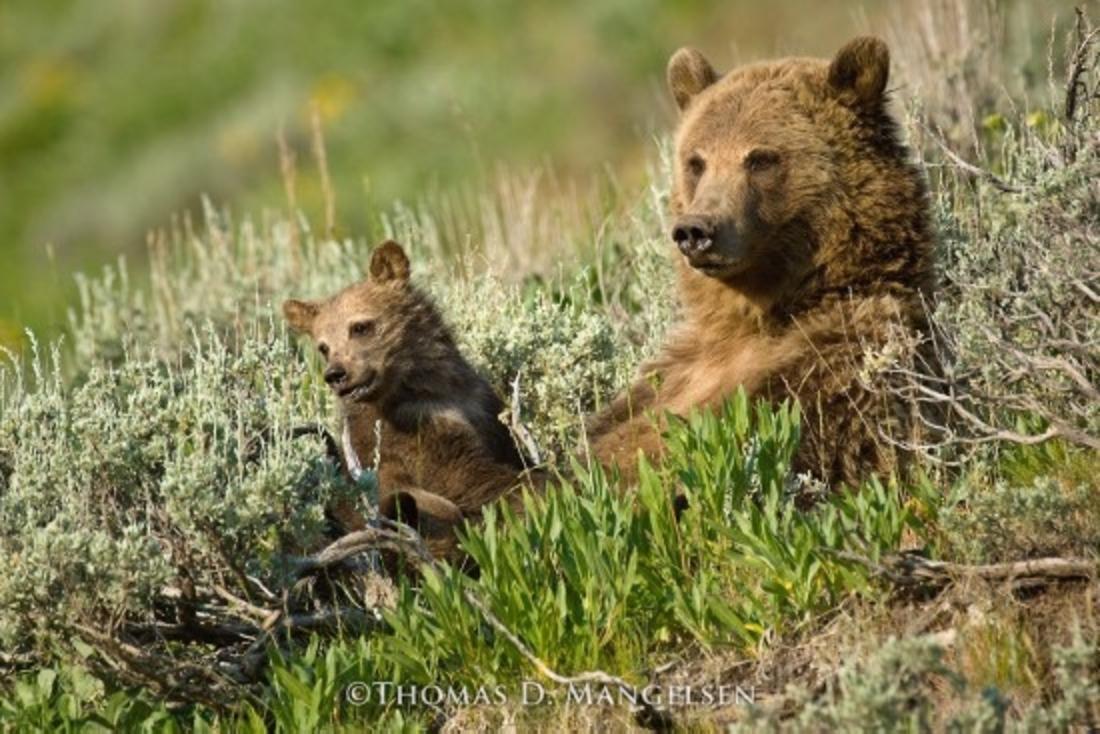Back to StoriesOf Bias And Bears: Is Delisting Greater Yellowstone's Grizzlies Based On Science Or Politics?
September 12, 2017
Of Bias And Bears: Is Delisting Greater Yellowstone's Grizzlies Based On Science Or Politics?Retired Forest Service scientist Jesse Logan says the rationale for removing federal protection for bruins doesn't hold up to scrutiny
My birth - a
historical fact of little significance to anyone other than myself - occurred
less than a week following D-Day. Another D-day recently occurred, the
delisting of the Greater Yellowstone grizzly bear population. This D-day, the
removal by the US Fish and Wildlife Service of Yellowstone’s grizzlies from protection
under the Endangered Species Act, is a historical fact of considerable
significance, particularly if you happen to be a grizzly or someone who cares
about them or wildness and the wild places they represent.
Delisting-Day
occurred on August 1, 2017. It wasn’t the first of these latter D-days, a
previous one occurred in 2007, and was subsequently reversed in court.
The reversal
by the courts then was based on, what I consider, as a retired researcher, to
be sloppy and misleading science used by the Interagency Grizzly Bear Study
Team to justify removal of federal bear protection, primarily relating to
misrepresenting the seriousness
of whitebark pine decline, a critical grizzly food resource.
This time
around, the science is no less sloppy, but the obfuscation has improved. One
effective strategy the Interagency Grizzly Bear Study Team has used is
promoting the false narrative that “science says” it is time to delist, or, that ‘science supports’ delisting. This is
important because any decision to delist a species must, by law be made, “solely on the basis of the best scientific … data available.” The false narrative of “science
supporting delisting” has been repeated so often by the grizzly bear study team
that it has become accepted on face value by much of the media. But what does
science really say? As a scientist myself, I say let’s take a look.
A
recent article published by The Ohio State University documented a disturbing bias on the part
of government scientists when it came to the subject of delisting Yellowstone’s
grizzlies. In fact, members of state and federal agencies were found to be two
to three times more likely to advocate delisting than scientists employed by
academic institutions. What is scientific bias, and how might it effect the
decision made by US Fish & Wildlife Service to delist Greater Yellowstone’s grizzlies?
Scientific
bias is defined as “the assumption that a theory is true or false without
evidence one way or another, or the
attempt to dismiss or discourage research efforts to confirm or deny the theory
-often on political or ideological grounds.” By this definition, the hotter
the political topic, the greater the chance (probability) for scientific bias.
It’s hard to think of a resource management issue with more excess political
baggage than grizzly delisting. So, what is the evidence for bias in the Fish
and Wildlife Service’s delisting decision?
The states of Idaho, Wyoming, and Montana have long resented
federal protection of grizzlies and consider protection under the Endangered
Species Act a classic example of federal overreach. In a May 24, 2012 letter to
then Secretary of the Interior, Ken Salazar, Wyoming Gov. Matt. Mead forcefully
requested immediate delisting of Yellowstone’s grizzlies. Salazar’s response to
Mead’s letter is, to me, even more troubling. Salazar stated, “All participants (in a meeting convened by the grizzly bear study
team) agreed that the Yellowstone grizzly population was recovered and that declines
in whitebark pine do not threaten the future
of this
Grizzly population.”
Language in the
remainder of Salazar’s letter leaves no doubt what the expected outcome of
“scientific results” will be, and he concludes by adding, “We look forward to a
scientifically-sound decision which will validate [my emphasis added] our State/Federal partnership as one of the greatest
success stories under the Endangered Species Act.” It is hard for me, as
a former federal scientist who spent years of my life dealing with whitebark
and other species, to imagine a clearer directive for agenda driven science -
and it came from the Secretary of the Interior. It suggests the result was determined
(ordained) before the research was conducted into the actual fate of whitebark
pine and the impact of its dramatic decline as a food source for grizzlies. The
agenda clearly seems political.
"The political appointees serving under the President and Mr. Zinke have demonstrated overt antagonism to the very mission of their bureaus, drastically cutting, and engaging in overt censorship." —Jesse Logan
The Trump
Administration seems hell bent on dismantling any federal science that deals with
environmental issues, all the way from Secretary Zinke’s level on down. The
political appointees serving under the President and Mr. Zinke have
demonstrated overt antagonism to the very mission of their bureaus, drastically
cutting, and engaging in overt censorship. In the face of this, what possible
difference can a citizen, or even a group of citizens make?
Although the
system is badly bent, it’s not entirely broken, and citizens, particularly
those united by a shared vision can yet make a difference. We need to do it
before it is in fact too late.
The legal
system is not the best, or even a particularly good, way to establish
environmental policy, but at present, this is what we have. Organizations that
have filed lawsuits protecting Yellowstone’s grizzlies in court include: EarthJustice representing the Northern Cheyenne Tribe, Sierra Club, Center for
Biological Diversity, and the National Parks Conservation Society; another has
been filed jointly by Western Watershed Project, Alliance for the Wild Rockies
and the Native Ecosystems Council. In addition, the Western Environmental Law
Center is representing Wild Earth Guardians, the Humane Society of the United
States and The Fund for Animals. Further, the Crow Nation is leading a coalition of
other tribes and indigenous religious leaders in a challenge, based on the
grounds that delisting the grizzly is in violation of their religion and the federal
Religious Freedom Restoration Act.
In the
future, I will explore the implications of scientific bias on the “best science”
criteria that is the legal foundation of the Endangered Species Act. In particular:
the loss of critical foods; genetic isolation; and above all, climate
change. These aren’t issues that are
abstractions for me. They at the center of my career as a forest ecologist.
Related Stories
July 15, 2018
Wide Awake In The Land Of Griz
Steve Primm in part 2 of his MoJo series asks, 'Are you really ready to explore bear country?'
July 30, 2018
Grizzly Or Black Bear?
As Wyoming moves toward its first trophy hunt of grizzlies in 44 years, it's a question that looms large. Is its...
June 27, 2018
A Hunger For Solitude During Visitor Season
After the guests depart, Susan Marsh savors a wild Snake and charismatic megafauna




